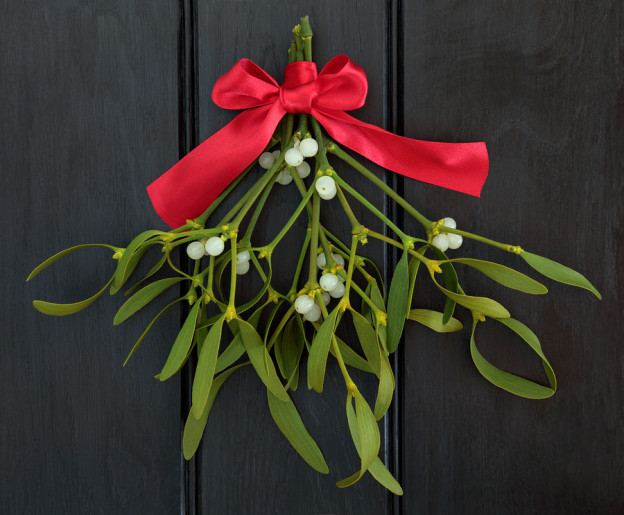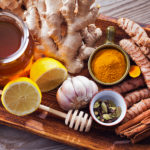By David Blyweiss, M.D., Advanced Natural Wellness
December 18, 2015
- Mistletoe’s secret healing power
- The spice you should eat every day
- Cranberries are good for more than urinary health
Now that the holidays are in full swing, I’ll bet you’ll find yourself under a sprig of mistletoe a time or two over the next couple of weeks. You might even get a few pecks on the cheek.
But mistletoe isn’t just for kissing. It also shows great hope as a powerful weapon in the fight against cancer.
You don’t hear much about it here in the U.S. But over in Europe, mistletoe has been used to treat cancer since the 1920s. It’s even considered a routine treatment protocol in European hospitals. And cancer patients swear by it.
That’s because certain phytonutrients in mistletoe kill off cancer cells by blocking the formation of new blood vessels.
Open your arteries, improve blood flow for a new health miracle...
Did you know your circulatory system has over 60,000 miles of arteries, veins and other blood vessels, if stretched end to end?
But as you age, your blood vessels undergo changes, which may cause them to stiffen, thicken and get clogged.
GOOD NEWS! Doctors have now identified a “Miracle Molecule” inside your arteries that helps OPEN your arteries and IMPROVE blood flow.
It’s what Dr. Valentin Fuster calls it, "One of the most important discoveries in the history of cardiovascular medicine."To you, that means...
- Healthy blood pressure
- Sharper mind and memory
- Skyrocketing energy and muscular strength
- Increased pleasure and passion in the bedroom
- Improved circulation to every cell and organ in your body
Go here to discover a new natural way to significantly boost the levels of this miracle molecule in YOUR body NOW!
You see, the growth of new blood vessels is required for cancer cells to spread. It’s a process called “angiogenesis.” By blocking it, cancer cells die off before they have a chance to cause a problem.
And for anyone undergoing chemotherapy or radiation, mistletoe can reduce side effects, boost your quality of life and may help put tumors into remission.
But that’s not all it does. Mistletoe also stimulates insulin secretion in pancreatic cells, which means it could be a healthy way to improve blood sugar problems if you have diabetes.
Now, it’s certainly not a good idea (or good manners) to pluck that mistletoe from above your head and eat it. The plant itself can be toxic. What you want is a mistletoe extract, where the key compounds – less the toxins – have been isolated.
Unfortunately, mistletoe isn’t available here in the same intravenous IV form they use in Europe, unless it is part of a clinical trial. But if you want to take advantage of its healing properties, you can always get the extract in the form of powder or capsule.
This is just one holiday secret I have to share with you today.
Are You Suffering From...
- Love handles and a pot belly
- Romance that isn't what it used to
- Forgetfulness and inattention
- Low (or no) strength and endurance
- A sex drive that's shifted into neutral...or worse
If so...you may have Mature Male Burnout. Click here to discover more about this unique condition and what you can do about it.
Next on the list is the winter spice that goes into some of my favorite holiday foods. It’s what gives spiced yams and cinnamon baked apples their “zing.”
I’m talking about cinnamon. It has so many great health advantages that you should be eating it every day – not just during the holidays.
Just 6 grams of this oriental spice can cut your blood sugar levels by almost third. It also slashes triglycerides and LDL by about the same.
This is great news if you’re diabetic, pre-diabetic or suffering from metabolic syndrome. It means cinnamon can help protect you from diabetes-related cardiovascular risks. And since people with diabetes have a higher than average risk of having a heart attack, this gives cinnamon an important role in your life.
But the good news doesn’t stop there. The compounds in cinnamon may also help ward off Alzheimer’s disease. It could even alleviate existing Alzheimer’s symptoms.
That’s because cinnamon appears to block tau filaments, which are associated with Alzheimer’s. In fact, it’s even been shown to disassemble the filaments, thus reversing the cell damage.
So don’t save cinnamon for the holidays. Make a habit of using it liberally throughout the year. It’s easy to add a spoonful to a cup of hot tea…apple cider…and even sprinkled on some of your favorite foods.
My final holiday secret?
Well, it’s not that red cranberry gelatin that gets passed around with turkey and dressing at holiday feasts. But cranberries themselves offer up a host of health benefits. And they go well beyond simply treating urinary tract infections.
In particular, cranberry juice can have a profound effect on your cardiovascular health. It helps balance out your LDL to HDL ratio. And if you have high blood pressure, it works as an ACE inhibitor to widen blood vessels and improve blood flow.
It even helps reduce inflammation and arterial stiffness.
I suggest skipping that sticky red gelatin and those sugary cranberry juice “cocktails”. Instead, just add an ounce of 100% cranberry juice to water or your usual juice. Or take 400 mg of supplemental cranberry extract daily for the same benefits.
Sources:
Elluru SR, et al. Antiangiogenic properties of viscum album extracts are associated with endothelial cytotoxicity. Anticancer Res. 2009 Aug;29(8):2945-50.
Kienle GS, et al. Complementary cancer therapy: a systematic review of prospective clinical trials on anthroposophic mistletoe extracts. Eur J Med Res. 2007 Mar 26;12(3):103-19.
Gray AM, et al. Insulin-secreting activity of the traditional antidiabetic plant Viscum album (mistletoe). J Endocrinol. 1999 Mar;160(3):409-14.
Khan A, et al. Cinnamon improves glucose and lipids of people with type 2 diabetes. Diabetes Care. 2003 Dec;26(12):3215-8.
Peterson, D.W, et al. Cinnamon extract inhibits tau aggregation associated with Alzheimer’s Disease in vitro. Journal of Alzheimer’s Disease. 2009;17(3):585-597.
Blumberg JB, et al. Cranberries and their bioactive constituents in human health. Adv Nutr. 2013 Nov 6;4(6):618-32.







